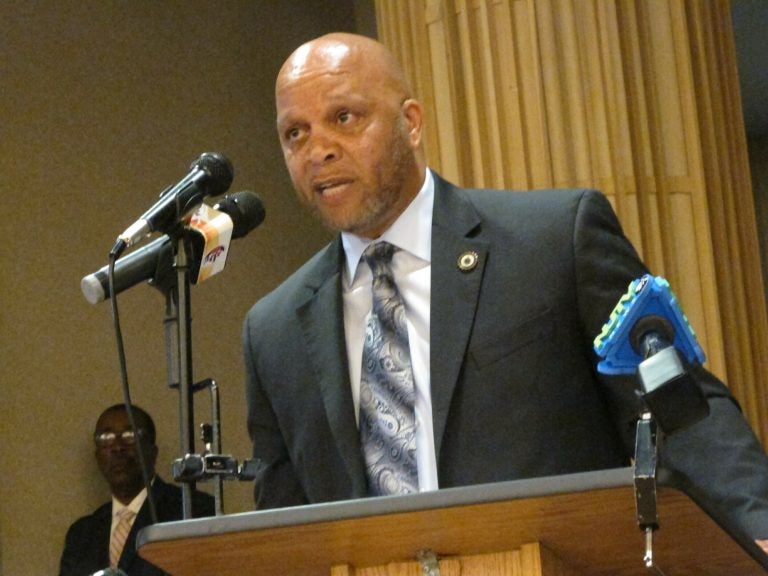New Jersey’s takeover of Atlantic City to last full 5 years
The timetable laid out Tuesday by Lt. Gov. Sheila Oliver would keep the takeover in place through 2021.

Democratic Atlantic City Mayor Frank Gilliam Jr. speaks at an event in Atlantic City N.J. on Tuesday April 23, 2019, at which state officials said New Jersey's takeover of Atlantic City will remain in place for the full five-year term envisioned by former Republican Gov. Chris Christie when it began in 2016. (Wayne Parry/AP Photo)
The administration of Democratic New Jersey Gov. Phil Murphy plans to leave a state takeover of Atlantic City in place for the full five years that his Republican predecessor envisioned in seizing control of the cash-strapped seaside gambling resort.
The timetable laid out Tuesday by Lt. Gov. Sheila Oliver would keep the takeover in place through 2021.
It began in November 2016 under Republican Gov. Chris Christie and a Democrat-controlled Legislature that concluded the city either could not or would not make the painful choices necessary to get its fiscal house in order.
Murphy campaigned in part on ending the takeover.
The law enacted in 2016 “was a 5-year statute,” Oliver said during a meeting in a community center. “We anticipate the statute will run for a 5-year period.”
At the end of that period, Oliver said, she hoped to demonstrate to the state Legislature that enough has been fixed in Atlantic City to warrant ending the takeover.
The takeover law gave the state broad powers, including the right to overturn decisions of the city council, override or even abolish city agencies and seize and sell assets, including the city’s much-coveted water utility. The state overseers could also hire or fire workers, break union contracts, and restructure the city’s debt, most of which was done to varying degrees, although no major assets were sold.
It was enacted during a dismal period for Atlantic City in which five of its 12 casinos shut down, and taxes soared as the casino industry, the city’s dominant employer and taxpayer, shriveled. Two of those five casinos have since reopened.
Mayor Frank Gilliam Jr. said he supports the state’s timetable for ending control, praising a turnaround plan that was developed not only by elected officials but by community leaders.
A plan announced Tuesday calls for reforms in government effectiveness and accountability, job training and economic development, finding new revenue sources and providing more opportunities for youth. It includes training new workers for casino jobs, helping those with criminal records find and keep employment, and address health issues, including opening a supermarket in the city so residents can buy fresh food locally.
“I don’t foresee this plan failing,” Gilliam said. “For so long, folks have believed that Atlantic City could not flourish within its own self. The Debbie Downers of Atlantic City need to jump off that horse.”
Follow Wayne Parry at http://twitter.com/WayneParryAC
WHYY is your source for fact-based, in-depth journalism and information. As a nonprofit organization, we rely on financial support from readers like you. Please give today.




